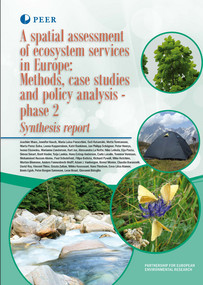Protecting ecosystems brings benefits to society - A synthesis report for policy makers
Ecosystems are essential to our well-being and prosperity as they provide us with food, clean air and fresh water. Ecosystems also represent an exceptional source of outdoor recreation opportunities.

The functions performed by ecosystems that increase our well-being are called ecosystem services.
The PEER Research on EcoSystem Services (PRESS) initiative describes how different EU policies can help to increase the services and benefits provided by ecosystems, and calls for the inclusion of the ecosystem services approach into European policy measures affecting the use or state of natural resources.
The results of this research initiative were presented in Brussels on 13 September to an international panel of experts which helps DG Environment of the European Commission with the implementation of the EU Biodiversity Strategy to 2020. The report prepared to describe these results outlines a strategy which aims to promote a better understanding of how ecosystems and biodiversity provide essential benefits to our society.
Launched in 2010, the PRESS initiative demonstrated how European researchers, including social scientists, economists, and ecologists, can combine their expertise to map and assess the natural, social and economic values of ecosystems services.
The first phase of the study, which was concluded in September 2011 with the publication of a first PRESS report, demonstrated methodologies to map the role of ecosystems as providers of clean water and recreation and investigated how ecosystem services can be mainstreamed into agriculture, fisheries or forestry policies.
The second and final phase of the study consisted of case studies carried out on pollination, recreation and water purification to explore how assessment methods to measure and map ecosystem services might be developed at multiple spatial scales.

A spatial assessment of ecosystem services in Europe: Methods, case studies and policy analysis – phase 2. Synthesis report is intended to convey four main policy messages:
- The capacity of wetlands, rivers, streams and lakes to remove or immobilise pollutants is essential to the provision of clean water for multiple uses and decreases costs of wastewater treatment based on technological solutions only.
New proposals of the European Commission to green the Common Agricultural Policy and to restore wetland ecosystems are predicted to have positive effects on water purification services, thereby improving water quality and increasing the economic benefits to society.
- Outdoor recreation services are one of the most immediate perceived benefits of ecosystems to people. The PRESS study presents evidence of high visitation rates to natural areas, in particular forests. Surveys show that citizens are willing to pay for continued access to forest ecosystems for recreation purposes. On a national scale, the value of forests for recreation may be in a range of billions of Euros. This value increases when we consider the avoided cost for health care due to the restorative and stress reduction capacity of recreational activities. Green urban areas such as city parks also have high recreational potential. The PRESS study report describes spatial methods to identify where investments in green urban areas reach their highest potential.
- Insects such as bees and bumblebees are key actors in providing pollination services to maintain Europe’s crop production, in particular of fruit and vegetables. High resolution data of forests and riparian areas were used to map the ecosystems in which bees and bumblebees build nests and find nectar-carrying flowers. Such information is important to convince farmers to help manage and protect these habitats as they increase their agricultural output.
- The mapping, assessment and valuation of ecosystem services are necessary but not sufficient steps in achieving the ecosystem services targets of the EU Biodiversity Strategy. We need to develop a thorough understanding of how we determine the levels of the various ecosystem services and the impacts of current policies on ecosystems. Sound and cost-effective management of ecosystems should also take into account those EU policies that directly and indirectly influence ecosystems and the services they provide, e.g. policies designed to bring about social and economic changes, such as those on international trade, agriculture, land use, and nature conservation.
Including the ecosystem services concept in all social and economic policies would allow for a systematic review of their impacts on services, beyond conventional environmental assessments. The PRESS initiative recommends that new policies should be flexible in design and continuously monitored in order to be able to react and adapt to new circumstances, and that baseline levels and goals should be quantified in order to be able to measure progress. It calls for the broad collaboration of stakeholders at all levels, including researchers, policy makers, and citizens.
The PRESS-2 Synthesis report to download from www.peer.eu.
Printed copies may be requested by sending an email to info@peer.eu.
A full version of the technical report will be published online in the coming days.
Project Coordinators:
Joint Research Centre (JRC)
Alterra Wageningen UR
Helmholtz Zentrum für Umweltforschung (UFZ)
